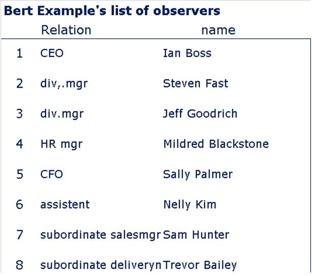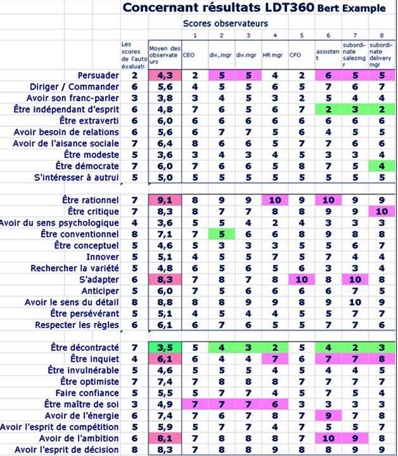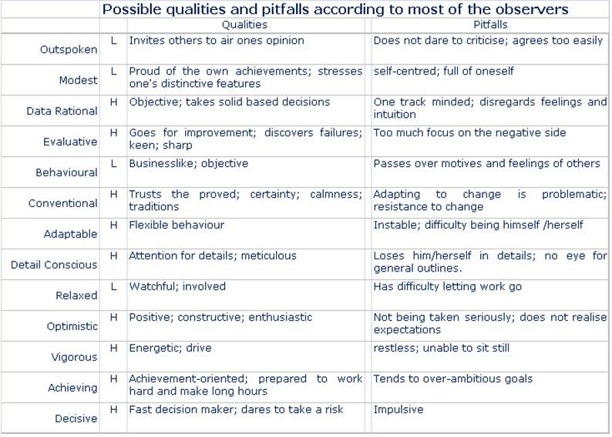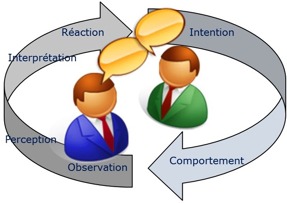EXAMPLE LDT360
Nous We will follow parts of the LDT360 process of Bert Example, a division manager in a large international company. He has gone through the first three phases of the tool based
LD-process (Measurement, Awareness and Invite Observers). The personality questionnaire used in his case is the OPQ).
As you can see, Bert has chosen to invite his manager (Ian Boss), four colleagues from the management team (Steven Fast, Jeff Goodrich, Mildred Blackstone and Sally Palmer) and two subordinates (Sam Hunter and Trevor Bailey) to score him in the LDT360.
Note: It’s not really necessary to solely invite people in your direct working environment. You may also wish to invite people in your own private environment (friends, family members) or in other relationships (customers, former colleagues, etc.). Be aware of that every observer will see you from his own experienced context.
From the table to the left, you see how the different observers have scored Bert’s behaviour.
You see a large variety, which confirms that people tend to perceive others in a very individual way (‘objectivity’ hardly exists).
Below you see the details of the scores for the dimensions Persuasive and Relaxed.
From the observers average scores you may conclude some trends, although the scores from the different observers still may vary quite so much.
In the case of Bert Example, the Persuasive dimension has been scored substantially higher by two of his colleagues and all of his subordinates. This may find its explanation in the fact that Bert has a more intensive work relation with especially these observers.
Looking at the dimension Relaxed we see that all observers score a much lower score than Bert himself.
The observers obviously experience Bert as more tense than he feels himself.
Such score differences call for a further analysis and explanation about how the different observers perceive Bert. And it may be very interesting to find out about the causes and reflect about the possible effects.
Asking the ‘right’ questions during the 1:1 review with the observer could help you to find explanations, but their answers might also include some hints about whether your behaviour is effective or not.
Don’t forget to ask about how the observer perceives your qualities and pitfalls. And, don’t hesitate to ask for advice about a possibly more effective behaviour. The LDT360 reports will help you to identify the questions you should ask yourself (because of a general trend in the observer’s score that differs from your self score).
And they will help you to identify potential qualities and the possible pitfalls of the same behaviour. Make sure to have this in the back of your mind during the review with your observer. It would, by the way, be counter productive to put all the possible questions to all observers.
Some observers can become bored and even annoyed if many of the questions are less relevant for your mutual relation. This is why there is a sheet for every single observer review, showing his scores and score differences.
Above you see some of the scores from Ian Boss and Sam Hunter (the People Interaction scores), plotted on Bert's self score.
The most relevant questions with Ian Boss are about his interpretations of Controlling, Modest and Independent Minded, so none of the above questions.
Ian’s different view on Bert might have to do with the hierarchical relation(Ian is Bert’s superior) and Ian’s own feeling about how Bert lets himself be managed by Ian.
The most relevant questions with Sam are about Persuasive, Democratic, Modest and Independent Minded, which also may have to do with the hierarchical relation (Sam is Bert’s subordinate).
Remember that an observer sees you through his own eyes and from his own subjective perception of the context. And the result of your interaction will be strongly dependent on that.
The LDT360 reviews probably are the most valuable source of information for you, since they make you aware of that the outcomes of your interaction may differ from what you would have expected. This, of course, is rather important for your personal behavioural effectiveness.











